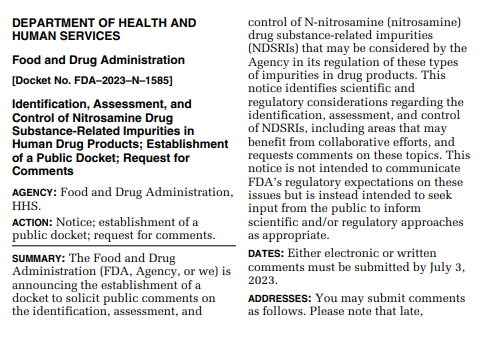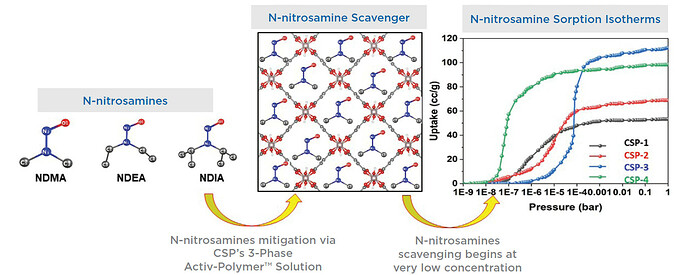@trust_user_a @trust_level_1 @trust_user_c
Attention, attention!
This morning the Food and Drug Administration (FDA) published Notice in Federal Register under docket # FDA-2023-N-1585 to solicit public comments on the identification, assessment, and control of nitrosamines drug substance-related impurities (NDSRIs).
Link to access the Notice: https://www.govinfo.gov/content/pkg/FR-2023-05-04/pdf/2023-09526.pdf
Deadline for comments submission July 3rd 2023
https://www.federalregister.gov/documents/2023/05/04/2023-09526/identification-assessment-and-control-of-nitrosamine-drug-substance-related-impurities-in-human-drug
Issues for consideration and request for comments
- FDA is requesting comments from the public regarding the identification, assessment, and control of NDSRIs in drug product development and regulatory review to provide interested parties an opportunity to comment on scientific and regulatory considerations, including areas that may benefit from collaborative efforts
- FDA is also interested in any challenges preventing industry from identifying, assessing, and controlling NDSRIs that may assist FDA in its analysis
- FDA is interested in other pertinent information that stakeholders would like to provide on issues and challenges related to addressing NDSRIs
Questions
- What additional topics related to the evaluation of nitrosamines should be a priority for the Agency to address through guidance documents?
- What factors should FDA consider in prioritizing its evaluation of NDSRIs on a compound-specific basis?
- What additional mitigation strategies should be considered for reducing NDSRI formation or
eliminating these impurities (where feasible) - What scientific and technical
factors should FDA consider in developing best practices for conducting testing for NDSRIs (e.g., Ames test, enhanced Ames test, followup in vitro mutagenicity, in vivo transgenic gene mutation test) in support of establishing AI limits? - Are there other tests recommended for assessing mutagenic potential of NDSRIs, and how supportable are these methods?
- Would ‘‘short-term’’ carcinogenicity testing (e.g., 6-month transgenic mouse model) be informative to evaluate the risk associated with NDSRIs?
- If so, what are the advantages and disadvantages to such testing? Are there other types of studies that may further inform FDA about the risk associated with NDSRI (e.g., in vitro/in vivo metabolism, DNA biomarkers, identification of reactive intermediates)?
- FDA recommended in the Nitrosamine Guidance that confirmatory testing of drug products and submission of required changes in drug applications be concluded on or before October 1, 2023 (see Ref. 3 at 17). Would an extension of the recommended timeline for submission of changes in drug applications as described in the guidance to June 1, 2024, allow for additional assessment of NDSRIs and enable collaborative efforts among affected applicants? How can FDA further support manufacturers’ efforts toward the completion of confirmatory testing?
- How can FDA facilitate collaborative efforts to generate reliable compound-specific data on NDSRIs and reduce the need for additional and potentially duplicative testing?
- Are there obstacles that industry has encountered when engaging in collaborative efforts that could allow companies to share data to assess the safety of NDSRIs, particularly with the intent of reducing redundant testing and integrating the 3R principles? Such examples of collaboration may include enhancing (Q)SAR methods and models, conducting in vitro mutagenicity testing and/or in vivo transgenic gene mutation tests. If there are such obstacles, are there ways that FDA could facilitate collaboration?
- In implementing recommendations for controlling nitrosamines, including NDSRIs, have manufacturers or suppliers experienced difficulties with meeting recommended AI limits that
has led to discontinuation of manufacturing or distribution

